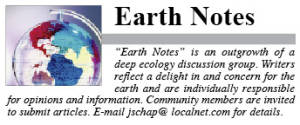Unintended consequences
By Price Hutchins
 Nature will win. We will not, can not, destroy the earth. A specific niche may disappear, a species may not survive our misdeeds, but nature will persevere. The consequences of our actions will change our surroundings not make them disappear.
Nature will win. We will not, can not, destroy the earth. A specific niche may disappear, a species may not survive our misdeeds, but nature will persevere. The consequences of our actions will change our surroundings not make them disappear.
Consequences are something that follows from a set of conditions. In my case, the consequences of working on my roof are that I often find myself off that roof and lying on the ground. In the natural world the consequences of not fertilizing my lawn is a stubbly, brownish, neighbor-annoying yard.
“Unintended consequences†are the things that happen when you do “A†to get “B†and didn’t even think “C,†“D†or “E†would happen. I add fertilizer to my lawn and the verdant grass now becomes host to a tribe of ticks, or worse.
Our own Army Corps of Engineers is famous for “discovering†unintended consequences. They have built huge dikes to protect valuable land only to discover that they unwittingly increased the threat of flooding further downriver. They have created dams to manufacture cheap electricity and maintain agricultural water and in doing eliminated game fish, and added unwanted salts to the soil. I don’t mean to start a debate about which is good or better or unavoidable. Only that when you mess with a complex system things that you never imagined will happen.
Ocean-going traders introduced snakes to Hawaii and the natives have spent over a century trying to un-introduce them. Mother Nature is still present in Hawaii. She just isn’t a flightless bird anymore.
Here’s an example that’s close to home. During the early years of the American Revolution, General Knox's men nearly starved bringing their cannons from Ticonderoga to Boston via western Maine. They starved because the primordial forest that was western Maine was so dark and mature that deer, moose, bear, and rabbit did not live in western Maine. It took heavy population growth and then industrial logging to create clear-cut and meadows that entertain browsing deer and foraging rabbits. When my friends all decry the rape of our local environment and long for “Maine the way it was,†I don’t disagree but I wonder which Maine they long for?
I am an avid fly fisherman. I have not intentionally killed a fish in over 30 years. I have lovingly restored each caught fish to its home and occasionally been guilty of snobbish reprove of “meat fisherman.†In the interest of a healthy and robust trout population, I have been a true husband of Mother Nature. An unintended consequence has been that I may not have been a true husband of the brook trout species. Fish biologists are now demonstrating that in the great trout waters of western Maine we have a healthy, robust population of native brook trout. In the Catch and Release areas that population is particularly healthy — but with smaller fish. It seems that not killing fish means more are remaining but there is not enough food to create the big guys and so Mother Nature has decided to accommodate me by more fish, small fish. Who knew?
A generation ago my father. a world-class fisherman, taught me how to gently and carefully release brook trout back into the moving water, but he aggressively tossed every “junk†fish†(junk fish is every fish but a trout) up onto the shore to die. Today, I figure every fish deserves a place. With one exception: An introduced fish belongs on the shore being picked by the birds. Introducing a fish from away does not bother Mother Nature. She merely accommodates. That fish survives to the detriment of some other species.
Introducing wolves seems like an ok idea, but I have to remember that my dog and your cat become the unintended consequences of that wolf-embracing move. Ok for your cat, not so ok for my dog!
The neighborhood I live in has an annual debate about spraying for mosquitoes. I am not a mosquito hugger. I am not a rabid anti-pesticide guy. I am convinced though that when you try to kill hordes of mosquitoes there will be consequences you didn’t imagine. In this case at least I’d opt for a pest in lieu of a monster.
I am a tree hugger. I am an environmentalist. I try to be a good husband of my surroundings. But, I am lost in a maze of changes and controls. Every change and every control has unintended results. Every time we touch the place we live in we change it. Do nothing or do everything and Mother Nature will recover, but that end may not be the one that includes your little cabin with no mosquitoes, some cute rabbits, and only friendly wolves.
Price Hutchins is at the peak of a mediocre career. This career includes restaurant owner, carpenter, stay at home Dad, chemical salesperson, entrepreneur, and Home Depot associate. Price and his wife, Ann, have returned to Bridgton while they continue the renovation of their Lovell house.

